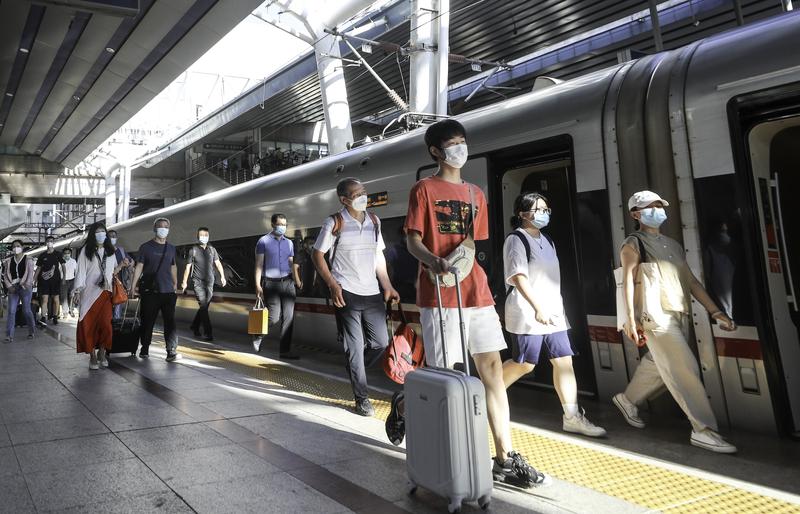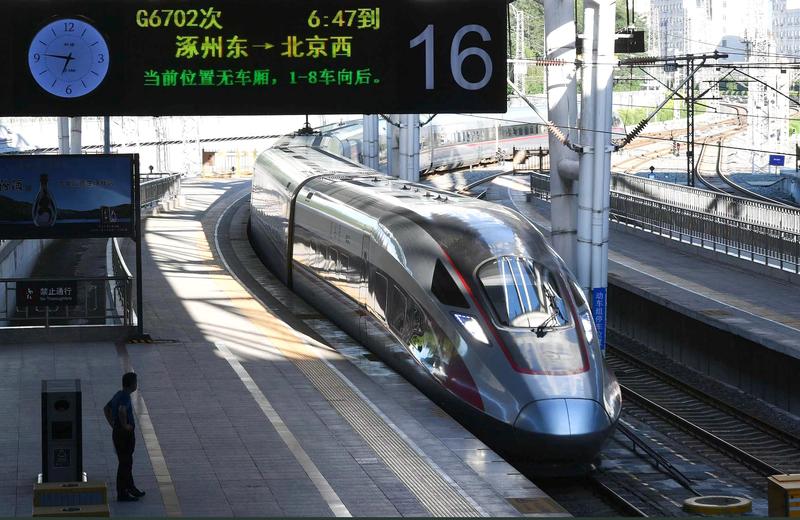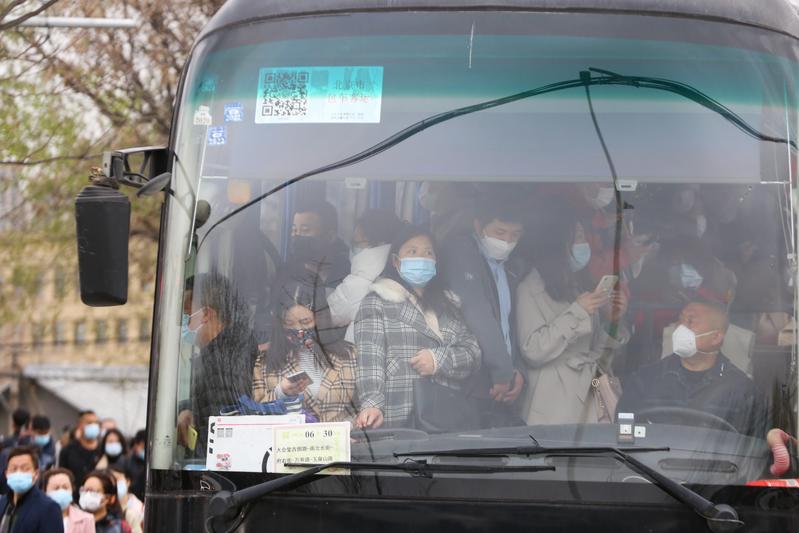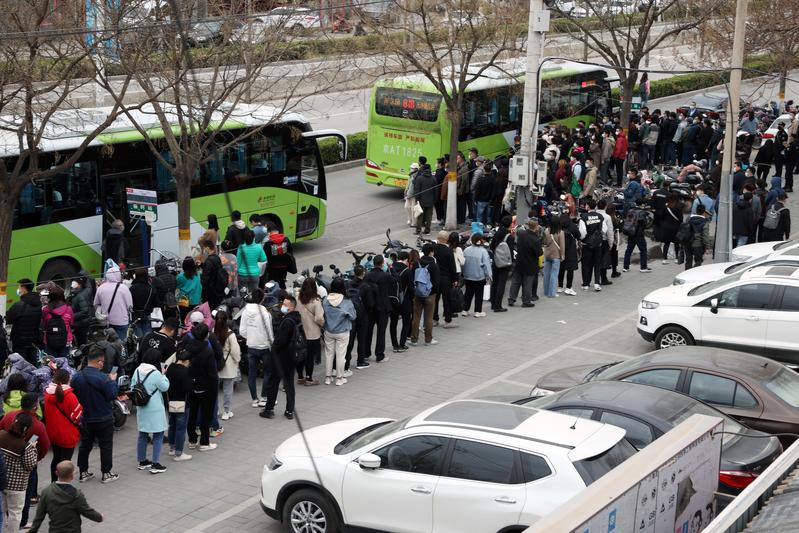Series of measures announced to ease travelers' woes
 Passengers leave the first high-speed train from Zhuozhou to arrive at Beijing West station. The new service began operating on July 18. (JIA TIANYONG / CHINA NEWS SERVICE)
Passengers leave the first high-speed train from Zhuozhou to arrive at Beijing West station. The new service began operating on July 18. (JIA TIANYONG / CHINA NEWS SERVICE)
Commuting costs in megacities have been increasingly in the spotlight in recent years.
These metropolises typically boast a wealth of government policy resources, public welfare services and individual career opportunities.
In Beijing last year, people living in central urban areas of the Chinese capital spent 51 minutes on average commuting to work, traveling a distance of 13.3 kilometers. These figures are included in the 2021 Beijing Commuting Characteristics Annual Report released recently by the Beijing Transport Institute.
Like me, tens of thousands of people spend four to six hours a day commuting. I live in a large residential community, where most of my neighbors work in Beijing.
Zhang Zhixiang, who lives in Sanhe, Hebei province, and works in Beijing
A commuting time of 45 minutes has become a common targeted standard for big cities worldwide, while a journey time of 60 minutes or more is regarded as "extreme commuting".People who spend over an hour each day on a single trip from home to work are known as "super commuters".
Keeping commuting times within 45 minutes is now regarded as an important indicator of a healthy urban transportation system.
According to the transport institute's report, those spending 45 minutes or less on a single trip in central areas of Beijing comprised 52 percent of commuters. Most of them live within the Fourth Ring Road.
Beijing's morning rush hours are from 7 am to 9 am, but this does not mean that every area of the city is bustling by 7 am.
According to the institute, those commuting at the peak of the morning rush tend to travel from the southwest of the city to the northeast-a reflection of their living and working conditions and the economic structure in different areas of the city.
Feng Yuying, 29, a designer living in the southwestern district of Fengtai, rises at 6 am to travel to work in Chaoyang district by subway.
"It takes me about an hour to get to my workplace, which is acceptable to me, as many of my colleagues spend even more time commuting," she said. "The subway can be very crowded after 7 am, so I prefer to commute early."
There are 16 districts in the capital, along with the Beijing Economic-Technological Development Area in the southeast of the city.
In inner districts such as Dongcheng, Xicheng, Chaoyang, Haidian, Shijingshan and Fengtai, people usually commute to workplaces throughout the city. However, in outer suburban districts such as Miyun, Huairou, Pinggu, Yanqing and Mentougou, most residents work locally due to the distance from central Beijing.
Residents in Fangshan district, which is farther southwest of central areas than Fengtai, and those in the western district of Shijingshan go to work the earliest, mainly before 7:30 am. Most of them have to commute to jobs in other districts, where there is more employment.
 The first high-speed train on a new service operating between Beijing and Zhuozhou, Hebei province, arrives in the Chinese capital on July 18. (ZOU HONG / CHINA DAILY)
The first high-speed train on a new service operating between Beijing and Zhuozhou, Hebei province, arrives in the Chinese capital on July 18. (ZOU HONG / CHINA DAILY)
People living near the southwestern Third Ring Road and Fourth Ring Road mainly start commuting from 7:30 am.
Residents living in northeastern areas, including Wangjing in Chaoyang, and also in the Central Business District, or CBD, where many companies are located, start going to work at 8 am. Most of them don't have to travel to other districts, which saves a considerable amount of time on commuting.
Cheng Han, a 28-year-old white-collar worker at a car company, lives in an apartment near his office in the CBD, even though the rent takes a large part of his salary.
"I cannot bear commuting for more than two hours every day, which I have tried, but it was terrible," he said. "I had no time to relax or get together with my friends after work. As my life just comprised work, commuting and sleeping, I decided to rent an apartment near my workplace."
Many people, especially the younger generation, think the same way as Cheng. As a result, the rental market in popular areas such as the CBD and Wangjing has matured. These areas "wake up" and "stay up" late, attracting young people with their vibrant commercial atmospheres and large populations.
Due to its convenient traffic system, people working in the CBD, where there are some 370,000 jobs, spend 50 minutes on average commuting each day-less time than in Shangdi area, where there are some 170,000 jobs.
More than 60 percent of those working in Shangdi spend more than one hour on a single-trip journey, and they have to wake up earlier than many others in the city to go to work.
Lei Fangshu, senior engineer at the Beijing Transport Institute, said, "The city's morning peak starts at a different time compared with other regions, and we refer to it as an urban 'wake-up call'."
The evening commuting peak in Beijing lasts longer than that in the morning, due to employees' different hours.
In addition, many people work overtime, so the evening peak lasts longer than elsewhere, with the busiest time being from 5 pm to 6 pm.
However, the evening peak is more congested than that in the morning because of factors such as shopping and leisure activities, which add to traffic jams, Lei said.
He suggested that to avoid congestion, commuters should take public transportation and try their best to avoid the morning and evening peak times for commuting on weekdays.
Residents living near the Fifth Ring Road and the Sixth Ring Road in Beijing form the majority of "super commuters", especially those in Tongzhou and Daxing districts.
Those facing even longer commuting times live outside of Beijing in three counties-Xianghe, Dachang and Sanhe-and in areas of Hebei province neighboring the capital.
 Commuters living in areas of Hebei neighboring Beijing set off to work in the city early in the morning. (WU XIAOHUI / CHINA DAILY)
Commuters living in areas of Hebei neighboring Beijing set off to work in the city early in the morning. (WU XIAOHUI / CHINA DAILY)
Early start
Zhang Zhixiang, who lives in Sanhe and works in central Beijing, gets up at 5:30 am and sets off for work 30 minutes later.
He usually arrives at the office at 8:30 am, traveling by bus and subway.
"Like me, tens of thousands of people spend four to six hours a day commuting. I live in a large residential community, where most of my neighbors work in Beijing," he said.
"I don't know how much longer I can stand this life of cross-city commuting, because it leaves me feeling drained. But I have a big economic burden paying for my apartment and my two kids' education, so I have to sacrifice my time and try hard to strike a balance between work and family life."
To spend more time with his family, Zhang is looking for job opportunities in Tongzhou, eastern Beijing, which is closer to his home in Hebei.
In past decades, a large number of people unable to afford high real estate prices in downtown Beijing have chosen to buy property and live in neighboring counties in Hebei.
The Beijing-Tianjin-Hebei Integrated Development plan, approved in 2015, is a national strategy aimed at helping the three provincial-level governments redistribute resources and industries from the capital to nearby regions to achieve better growth.
During the fifth session of the 13th Beijing Chinese People's Political Consultative Conference in January, Mao Daqing, a CPPCC member, said the total population of the Beijing-Tianjin-Hebei cluster is 110 million, and the area is home to 57 million commuters.
To get to work in Beijing, some 2 percent of these commuters have to cross different administrative regions, most of them neighboring the capital, Mao said.
"Around 900,000 people living in the cluster enter and leave Beijing each working day because of their jobs. Thus, the cost and time spent on commuting affect their sense of happiness to a large extent."
In Xianghe, Dachang and Sanhe, the three counties that are closest to Beijing, the total number of daily commuters has reached about 100,000. The main forms of transportation they use are cross-city buses and private cars, and they spend more than two hours on average commuting each work day.
After the COVID-19 pandemic emerged in early 2020, it took even longer for commuters from these counties to travel between home and work, as they had their health codes and nucleic acid test results checked before entering Beijing.
To provide a better service for cross-city commuters, Mao suggested the authorities should relocate checkpoints and accelerate the construction of railways between the capital and the three counties.
 Commuters living in areas of Hebei neighboring Beijing set off to work in the city early in the morning. (WU XIAOHUI / CHINA DAILY)
Commuters living in areas of Hebei neighboring Beijing set off to work in the city early in the morning. (WU XIAOHUI / CHINA DAILY)
Better service
The Beijing Municipal Commission of Transport announced recently that the capital would introduce an express bus service for a trial period to serve "super commuters" in these counties.
The service is expected to reduce the journey time to Beijing to about one hour. The shuttle buses, which will stop at the request of passengers, are expected to begin operating this week.
Passengers can book the service via the WeChat platform "Beijing-Tianjin-Hebei Tailored Commuter Buses".
Zhang, the worker who lives in Sanhe, said he would love to use the service, as it can save him as much as two hours' commuting time every day.
"I can spend the time saved with my kids. These detailed measures announced by the government have made me more confident about the Beijing-Tianjin-Hebei Integrated Development plan. I believe that this policy will make my life easier and better," he said.
On July 18, a high-speed railway service began operating between Beijing and Zhuozhou, Hebei, making life easier for cross-city commuters.
Located about 60 km southwest of downtown Beijing, Zhuozhou is home to more than 7,000 commuters working in the capital.
Passengers using the service pay less than 30 yuan ($4.45) for a single journey, and trains on the route can accommodate more than 1,000 travelers.
The first train to the capital leaves Zhuozhou East station at 6:23 am and arrives at Beijing West after 24 minutes, while the last train for Zhuozhou leaves Beijing at 10 pm and takes 25 minutes to complete the journey, according to China Railway Beijing Bureau Group Co.
The new service is expected to encourage the flow of personnel and also commercial exchanges between Beijing and Hebei, as well as easing travel woes on the road for these "super commuters".
Yao Yuxin contributed to this story.


